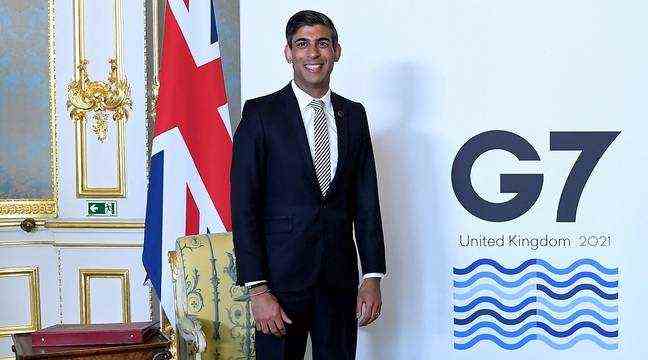Rishi Sunak, Chancellor of the Exchequer, is the finance minister of the G7 host country, the United Kingdom – Alberto Pezzali / POOL / AFP
A blow to “fiscal dumping”? The G7 finance ministers pledged this Saturday to the creation of a global corporate tax rate “of at least 15%”, according to a joint statement released on Saturday after a two day meeting in London. UK Finance Minister Rishi Sunak hailed “a historic deal”.
The finance ministers of Germany, Canada, the United States, France, Italy, Japan and the United Kingdom were also due to examine this Saturday a better distribution of tax revenues from multinationals, particularly digital giants.
“If we have an agreement [samedi], it will be a historic breakthrough, ”French Minister Bruno Le Maire stressed last night to some journalists on the sidelines of the meeting, the first in person since the start of the pandemic, which is being held at Lancaster House, in the heart of the British capital.
The major powers of the G7, benefiting from a renewed interest of the American administration on the question since the arrival to power of Joe Biden, wanted to achieve a global reform of the corporate tax in the spirit of the work undertaken within the OECD. It largely targets large technology companies, often American, which pay derisory taxes despite profits of tens or even hundreds of billions of dollars, by being domiciled in countries where the rate of corporation tax is very low, even no. In France, the corporate tax rate is generally between 28% and 31%
These digital giants have particularly benefited from the crisis and “reaped benefits of an unparalleled level compared to other sectors”, noted Friday in a common forum in the Guardian Bruno Le Maire and his German, Italian and Spanish counterparts.
The OECD is proposing a reform based on two pillars: on the one hand, a better distribution of the right to tax multinationals where they generate their turnover.
On the other hand, an international minimum tax rate on corporate profits, to fight against tax avoidance or even tax evasion. The United States, after first mentioning 21%, is now talking about 15%.
For Bruno Le Maire, the 15% threshold for corporation tax represents a “minimum”.
– “Considerable momentum” –
“We want with our partners from the G7, the G20 and the OECD to try to have a more ambitious rate”, he added, before concluding that “if there is an agreement of the G7 (Saturday) , this will give considerable impetus to the G20 negotiations ”, referring to the July meeting in Venice.
On the other hand, he warned, “if we fail” it will be “complicated” to “regain momentum”, and an agreement risks being postponed “indefinitely”.
For Quentin Parrinello, of the NGO Oxfam, “a rate of 15% would be largely insufficient” and “an agreement without mentioning a specific rate would be a real failure” which would set back several years.
Several countries including France, the United Kingdom, Italy and Spain have already implemented their own digital tax and discussions with the United States also concern the timetable for the withdrawal of these national measures in favor of international reform.
Most players know that they will then have to rally the G20 countries and then the almost 140 countries working on the tax reform project within the bosom of the OECD.
The challenge will be to convince countries which have built their economies on particularly low corporate tax rates such as Ireland (12.5%), which has thus attracted the European headquarters of many multinationals. .

